 Petzlover
Petzlover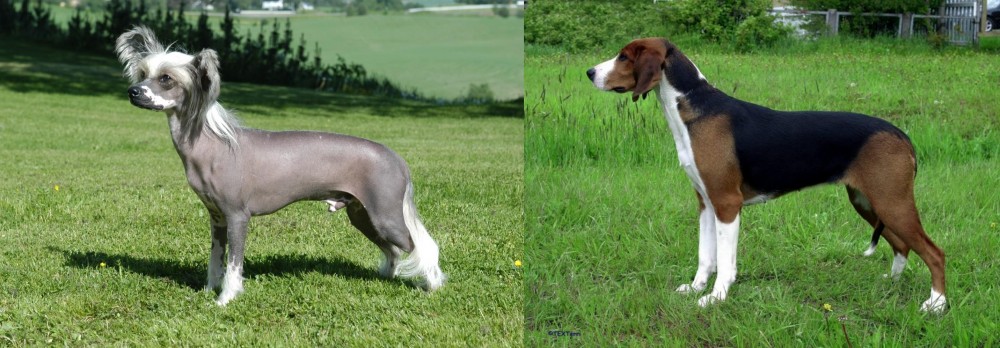 Chinese Crested Dog is originated from Mexico but Finnish Hound is originated from Finland. Chinese Crested Dog may grow 32 cm / 12 inches shorter than Finnish Hound. Chinese Crested Dog may weigh 20 kg / 44 pounds lesser than Finnish Hound. Both Chinese Crested Dog and Finnish Hound has almost same life span. Both Chinese Crested Dog and Finnish Hound has almost same litter size. Both Chinese Crested Dog and Finnish Hound requires Low Maintenance.
Chinese Crested Dog is originated from Mexico but Finnish Hound is originated from Finland. Chinese Crested Dog may grow 32 cm / 12 inches shorter than Finnish Hound. Chinese Crested Dog may weigh 20 kg / 44 pounds lesser than Finnish Hound. Both Chinese Crested Dog and Finnish Hound has almost same life span. Both Chinese Crested Dog and Finnish Hound has almost same litter size. Both Chinese Crested Dog and Finnish Hound requires Low Maintenance.
 The Chinese Crested Dog is believed to have its origins in Africa and there are many texts from the 19th Century that feature an Africa Hairless Terrier that resembles the Chinese Crested. However, the scientific and genetic evidence leads to an origin that is shared with the Mexican Hairless Dog. Any way you look at it the dog did not originate in China. The Chinese were very fond of this breed and used them on their ships to control the rat populations. This is probably how they got their name.
The Chinese Crested Dog is believed to have its origins in Africa and there are many texts from the 19th Century that feature an Africa Hairless Terrier that resembles the Chinese Crested. However, the scientific and genetic evidence leads to an origin that is shared with the Mexican Hairless Dog. Any way you look at it the dog did not originate in China. The Chinese were very fond of this breed and used them on their ships to control the rat populations. This is probably how they got their name.
There are two types of Chinese Crested Dogs – the well known Hairless, and the lesser known Powderpuff. The Hairless type is better known because they carry the dominant trait and the Powderpuff is recessive. However, this recessive gene is carried by every Chinese Crested Dog so the Powderpuff can show up in all litters even those of two Hairless Crested. Two Powderpuffs will not result in any Hairless in their litters as the Powderpuff does not have the gene for the Hairless.
The “Crest Haven” Kennel was opened by Debora Wood in the 1950’s to breed the Chines Crested Dog. At the same time Gypsy Rose Lee, of the famous burlesque shows, was also breeding Chinese Crested Dogs. The two lines of Crested bred by Americans came together following the death of Rose Lee. Every Chinese Crested that lives today can trace their heritage directly to these two breeding lines. In 1959, Debra Wood founded the American Hairless Dog Club which became a part of the American Chinese Crested Club or the ACCC in 1978. This organization then became the breed’s parent club after AKC (American Kennel Club) recognized the breed in 1991. Prior to this the Federation Cynologique Internationale, recognized the breed in 1987, the United Kingdom (UK)the Kennel Club recognized them in 1981 and the Australian National Kennel Council recognized the Crested in 1995.
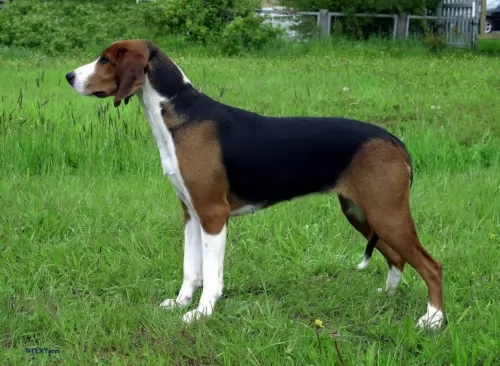 As one of Finland’s most popular dogs, the Finnish Hound isn’t particularly well known outside of Finnish borders. Known also as the Finsk Stovare, the Finnish Hound, known for its hunting skills, came about because of a breeding effort which started way back in the 1800s, mixing dogs such as different French, Swedish, and German hounds.
As one of Finland’s most popular dogs, the Finnish Hound isn’t particularly well known outside of Finnish borders. Known also as the Finsk Stovare, the Finnish Hound, known for its hunting skills, came about because of a breeding effort which started way back in the 1800s, mixing dogs such as different French, Swedish, and German hounds.
These hounds were used with the idea being to develop a dog that could do well in Finland’s terrain. The Finnish Hound is a great hunting dog but isn’t looked upon as an particularly awesome pet, although some pet owners would beg to differ.
 This is a toy breed and very small. The Hairless and the Powderpuff are two types of the same breed, although they do not look like it. The Hairless type can have fur anywhere on its body, but it will not have much. It will have hair on its paws, tail and head. The Powderpuff on the other hand will have a thick double coat. When discussing the color of the hairless, one is referring to the color of its skin. It can range from flesh to black.
This is a toy breed and very small. The Hairless and the Powderpuff are two types of the same breed, although they do not look like it. The Hairless type can have fur anywhere on its body, but it will not have much. It will have hair on its paws, tail and head. The Powderpuff on the other hand will have a thick double coat. When discussing the color of the hairless, one is referring to the color of its skin. It can range from flesh to black.
The Powderpuff has a soft, thick, straight double coat. It can have very long hair. The Hairless must have its skin taken care of and protected. Both types of Chines Crested are small in stature with well proportioned, athletic bodies.
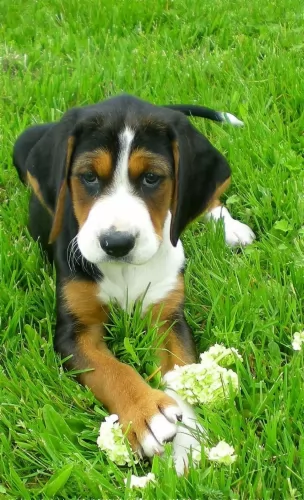 This is a medium sized dog who stands between 52 – 62cm in height and weighs in at 20 to 25kg. The Finnish Hound can have between 4 – 8 puppies.As a scent-hound, the Finnish Hound has a short, smooth double coat which is usually in a tri-color pattern of black, tan, and white.
This is a medium sized dog who stands between 52 – 62cm in height and weighs in at 20 to 25kg. The Finnish Hound can have between 4 – 8 puppies.As a scent-hound, the Finnish Hound has a short, smooth double coat which is usually in a tri-color pattern of black, tan, and white.
The attractive dog has an athletic, lean, muscular body full of energy and stamina. The eyes are brown and the dog has a peaceful expression. The medium length ears are floppy and the tail is long and carried low.
The Finnish Hound is friendly, calm and never aggressive. He is an intelligent dog nd will respond to the training and socialization he will require to turn him into an obedient, amicable pet, especially since he tends to be stubbon, independent and strong-willed. He isn’t recommended for small places in the city but will do better in the country with a fairy large piece of ground. The Finnish Hound is not recommended for apartment life. It is moderately active indoors and does best with at least an average-sized yard.
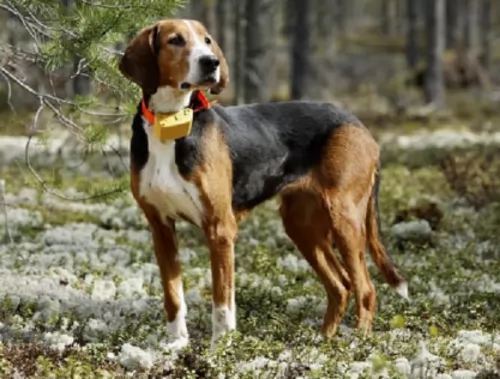 The Finnish Hound has always been a working dog and so he will require being well exercised.
The Finnish Hound has always been a working dog and so he will require being well exercised.
He makes a good pet with homes where there are other dogs as well as children. As a hunting or working dog, these days the Finnish Hound is also regarded as a companion animal, fitting into family life well, and turning out to be a loving, loyal pet.
 The Chinese Crested Hairless version must have its skin take care of much in the same way we take care of our own. It will burn if exposed to too much sun without protection. They can suffer from dry skin, acne, need moisturizing cremes. They get skin allergies as well and it is important to take care of the skin instead of the brushing you don’t have to do.
The Chinese Crested Hairless version must have its skin take care of much in the same way we take care of our own. It will burn if exposed to too much sun without protection. They can suffer from dry skin, acne, need moisturizing cremes. They get skin allergies as well and it is important to take care of the skin instead of the brushing you don’t have to do.
The Chinese Crested does not suffer from most of the diseases other toy breeds do. They can have ye issues. The Hairless have a “primitive mouth” . They have pointy teeth and poor dentition. This is not true of the Powderpuffs however. Their eye issues include:
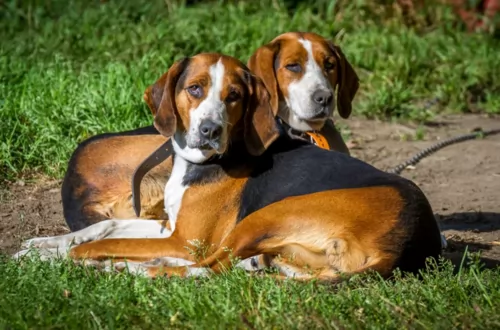 The Finnish Hound is looked upon as a generally healthy breed who can get to 12 years of age if looked after well. Good nutrition plays a huge role towards excellent health.
The Finnish Hound is looked upon as a generally healthy breed who can get to 12 years of age if looked after well. Good nutrition plays a huge role towards excellent health.
Check out common health ailments that can affect most dogs such as dental disease, obesity, hip dysplasia and a serious condition for which these dogs are particularly known – cerebellar ataxia. Lesions in the brain affect the dog’s coordination and sight. Get him to the vet as soon as you detect anything unusual with your pet.
 Like several other toy breeds, it is easy to overfeed the Chinese Crested because it has such a small stature. Feed once or twice a day but never more than one fourth of a cup total for the day.
Like several other toy breeds, it is easy to overfeed the Chinese Crested because it has such a small stature. Feed once or twice a day but never more than one fourth of a cup total for the day.
Luxating Patellas – kneecaps move out of place and cause lameness and arthritis
Legg-Perthes Disease – a hip disorder where blood does not reach the head of the femur. The bone dies, and growth stops.
Canine Multiple System Degeneration (CMSD) – a progressive movement disorder can call falls
This Breed does not need an excessive amount of exercise, but they do enjoy running. They are competitive and athletic, so they can excel at flyball, lure coursing, agility and obedience. They are sensitive and trainable enough to become a therapy dog.
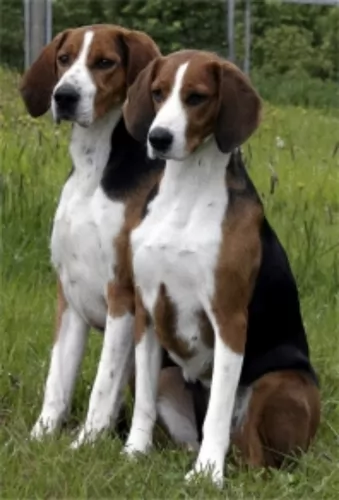 As a medium-sized dog breed, you want to make sure to feed your dog a high-quality commercial dog food – one that has been formulated with the right amount of vitamins and minerals for the type of dog he is.
As a medium-sized dog breed, you want to make sure to feed your dog a high-quality commercial dog food – one that has been formulated with the right amount of vitamins and minerals for the type of dog he is.
He is a high-energy hunting breed, so you wan to find a food that is appropriate to his needs. Home cooked brown rice, vegetables and chicken can be added into his kibble as a change and a treat from time to time as well as some raw meat occasionally. Make sure he always has access to fresh, cool water.
Physically active and mentally balanced and intelligent, the Finnish Hound will require both physical and mental stimulation to prevent him from becoming bored and frustrated.
As an average shedder, your pet's smooth, short-haired coat is easy to keep in tip top condition. All that is really required is to brush the coat down twice a week to keep it in peak condition.
Don’t neglect to check the inside of the dogs ears, as too much dirt and wax can cause nasty ear infections. Also, the teeth need to be brushed at least 2 or 3 times a week with special canine toothpaste and toothbrush. This will ward off tooth decay and lots of other problems within the body brought about by bad teeth.